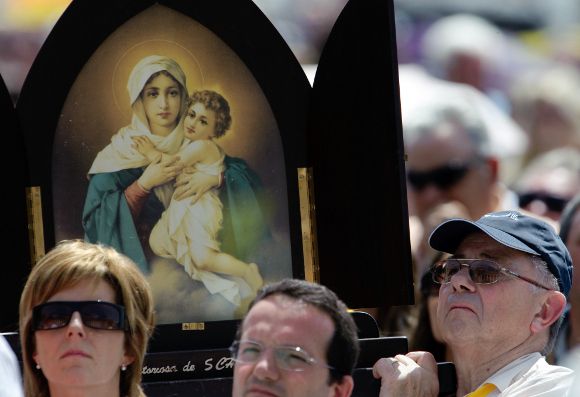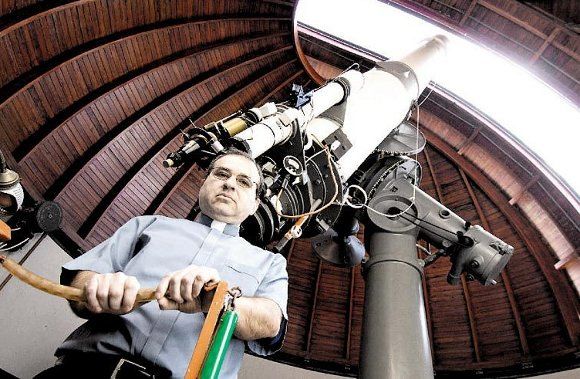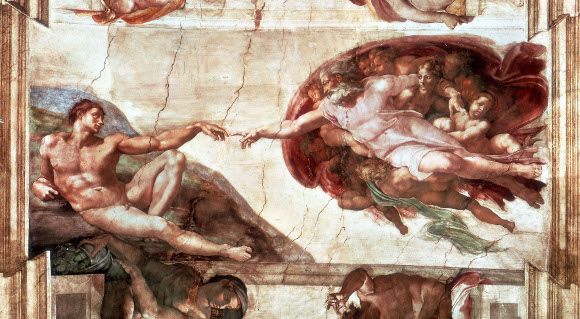'You should not take the words of the Bible literally, for instance the creation of the world. Important truths have been disclosed in these texts, but these truths have no scientific base' - says Nemesszeghy Ervin, the 80-year-old Jesuit father who entered the order in 1948. He could not pursue theological studies in those days, however he managed to obtain a high-school teacher's degree in mathematics and physics at Eotvos Lorand University of Sciences in 1956.
'There were times when many people took story of creation literally. The church have only come to the conclusion recently, of the connection between science and religion, and now strongly supports and emphasises this connection' - says Nemesszeghy, who travelled abroad after the Revolution and acquired a doctorate in philosophy at a London University.
There really were times like this, and the Catholic church who generally favoured science did not know how to deal with Giordano Bruno who was ahead of his time in 1600 with his view that the stars were all distant suns around which planets orbited, and that there was possibility of intelligent life on these planets. Giordano Bruno was nevertheless burned at the stake on a bonfire, this was not primarily for this view, but because he denied the 'virginity of Mary'.
The coming together of religion and science
It has been more than 400 years since the smoke from the bonfire has extinguished, and now in the same city an astrobiology conference was held by the Pontificial Academy of Sciences. In the individual sections the current position and possibilities of life beyond Earth was discussed in detail, from the birth of life to Giordano Bruno's theory that planets exist beyond our Solar System. Speakers included leading researchers in the field as well. (For a more detailed conference program, see our writing box.)

The conference was not unprecedented as in 2005 the Vatican briefly addressed the question of extraterrestrial life, and in spring this year a similar conference was held dealing with the topic of evolution by the academy. However believers of the theory of intelligent design were not invited, due to the fact they stubbornly reject any theory, which allows evolution.
'John Paul II, amongst others tried to establish the link between science and religion and then Pope Benedict XVI continued soon after in his foot steps. These conferences where timed and organised especially to coincide with the 200th anniversary of Darwin, and the 150th anniversary of his book the The origin of species' - says Nemesszeghy. This progress is obvious as John Paul II's advisor in this regard was the current Pope, but at that time was known as cardinal Joseph Ratzinger.
Firstly the story of creation is the bearer of religious truths
Does the church today accept the idea of evolution? The old Jesuit father believes that there is a slow 'evolution' going on about this issue. 'The great majority of the approximately one billion Catholic followers suffer from poverty and hence there is a lack of cultural training in order to understand the symbolism of creation. Many people - even people of the so-called developed countries - have not graduated past the point of a basic childhood understanding in terms of religious belief, and for this the Church can also be held responsible.'
After emigrating to Oxford, Nemesszeghy carried out a number of physical experiments. He compares the theological development of the biblical story of creation with the scientific development of atom models. It is common knowledge even for primary school children that electrons orbit the nucleus in the same fashion as the planets orbit the Sun. However high school children know that this is not exactly true in this sense because the electron can behave like a wave or like a particle and atomic structure has been described in a much more complex way such as being called the quantum mechanics model. Therefore it can be said that 'creation' is also just a 'theological model' that approaches belief the same way as a simple scientific model would approach reality.
Great theological questions
Today the church has come to assume the idea of general development, and by this they do not only mean the Earth's evolution, but have also considered the possibility of extraterrestrial life as well. Gabriel Funes Jesuit priest, the head of astronomy at the Vatican observatory last year stated, in the Vatican newspaper in the article headed The extraterrestrial is my brother: 'The possibility of the existence of life on Mars should not be ruled out and nor should the possibility of the existence of intelligent life created by the Lord outside our Solar System. And thus the search of extra terrestrials does not contradict faith in God and ultimately ruling out the existence of aliens would be like 'putting limits' on God's creative freedom.'

Gabriel Funes Jesuit priest, the head of astronomy at the Vatican observatory
All this leads to great theological questions. For instance: if extraterrestrial intelligent beings do exist then did Jesus die for them on the cross as well? Perhaps there was no need of redemption? - Nemesszeghy asks who has always considered his priestly service to be paramount as well as having an interest in scientific activity. 'This theology is only in its infancy, and the church is still very cautious about making any declarations about these issues, as clearly before they can do so they would need to crystallize their own opinion.'
What is certain is that these conferences indicate trends within the church, indicating an upcoming transformation. In order to answer the great theological questions of course it would be great to actually find extraterrestrial life, which would prove to be intelligent life. However a bacteria from Mars - which is the biggest chance currently - is not the most promising find in the eyes of the church as clearly it does not have intelligence nor free will.
'The possibility of free will only comes to existence in an intelligent life form. Where there is freedom, there may be supernatural existence. From the theological point of view only an intelligent life form is important, and our church has already reached the degree of development to announce religious freedom by the Second Vatican Council in its dogmatic constitution' - says Nemesszeghy. 'Its not certain whether extra terrestrials should be converted, if they are proved to exist, and nevertheless it could be argued that they should not be forced into belief as it would go against the 'so called' religious teachings.'
* * *
Opening in recent years
The Vatican and the catholic church in recent years have adopted a more relaxed approach towards the views of heretics in an attempt to modernise the church. Pope John Paul II who died in 2005 played a crucial role in changing the views of the church.
Although the Vatican did not rehabilitate Giordano Bruno the Italian scientist who was burnt at the stake in 1600 but only expressed regret for the 'martyr'. However In 1992, Pope John Paul II (reluctantly) formally apologized for the persecution of Galileo for defending heliocentrism.
The strongest evidence that illustrates the Vatican's more open minded approach towards science is the decision to change its rigid previous views on the theory of evolution. Pope John Paul II in 1996 addressed a letter to the Pontifical Academy of Sciences, in which he expressed 'recent discoveries are increasingly leading us to the recognise that evolution is more than a hypothesis'. The practical acceptance of the theory of evolution is proved by the Pontifical University of Gregorian holding the conference to coincide with Darwin's anniversary this spring.
In this conference secular and religious researchers discussed their views on evolution and evolutionary theories. The conference was of paramount importance because it did not invite the creationism followers, nor the 'scientific' creationists namely the 'experts' of Intelligent design. The current congress on Astrobiology ruled out another taboo, as previously the question could not have even arisen before, whether God created extra terrestrials, let alone intelligent life forms.

| The conference 'The heavens declare the glory of God; the skies proclaim the work of his hands.' quoted the Psalms in the forward of the publication of the conference drawn up by Pope, XVI. Benedict 'If the heavens do actually declare Gods glory then the laws of nature which over the centuries have been made understandable through men and women researchers, then they motivate us to contemplate with the work of the Lord.' The question of the possibility of extraterrestrial life existing leads us to consider a number of philosophical and theological issues, however the main objective of the conference was to examine the issue in a scientific manner and also show how to exploit the various disciplines of knowledge in this particular field. Well known researchers throughout a number of countries participated in the conference, and put forward crucial topics of astrobiology studies. For instance the first appearance of terrestrial life forms was discussed and other lectures dealt with the great leap in evolution of life on Earth. There was also reports on exoplanets, and discussion on the search for Earth-type planets, as well as reports on the upcoming space missions. The program also included analysing the habitats in the Atacama desert and other similar missions, like examining the environment of Mars, and also included discussion on SETI research (Search for Extraterrestrial Intelligent) as it was 50 years since the first SETI-related article was published in 1959 in the prestigious journal Nature. |

Óriási bajt okozott a NASA, pusztító aszteroidák ezrei tartanak a bolygó felé

Nem a Louis Vuitton-bolt volt az első luxusüzlet az Andrássy úton, amit brutálisan kifosztottak

12 évente történik ilyen: hatalmas gazdagság vár három csillagjegyre

Már a hó is esik idehaza + fotó

Már Jürgen Klopp is lemondott róla? Szoboszlait támadják Angliában

Van egy sokkal találóbb kifejezés erre a mocskos, alávaló, szemét gazemberre

Marics Petiről vallott Stana Alexandra

Keddi sportműsor: olimpiai csoportellenfeleket kapnak kéziseink

Magyar Péteren és a rikácsoló sorozatszínészen röhög az internet - mémek

Az újpesti legenda fia szerint egyértelmű, miért nincs helye az NB I-ben

Oroszország háborús üzenetet küldött Izraelnek és Iránnak
